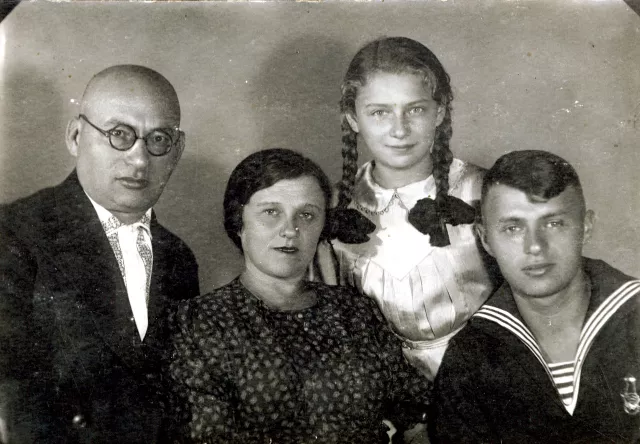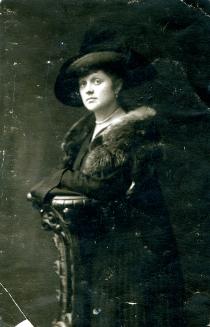My family. I am the second on the right. Next to me is my brother Yosif, student of the Higher Command Naval College. On the left next to me is my mother, Rachel Pan, then my father, Boris Pan.
The photo was made in September 1939 in Kiev.
I don't remember any Jewish holidays there. At home they spoke Russian. The oldest generation began to speak Yiddish only when they did not want their children to understand them. Their children did not speak Yiddish.
My father Ber, being the eldest son of Aaron and Hanna, had the hardest time making his way into the world. His constant duties to take care of the younger ones took a lot of his time. In order to pay for getting higher education, he tutored a lot of children in the Jewish families of Kiev. He knew Hebrew well. The Revolution of 1917 changed little in his life, but made possible his marriage with Rachel Gorenstein, my mother, who was very rich before the Revolution. They were a very good couple.
They lived very happily together till December 31, 1942, the day when my father died of a stroke. They had fled the Nazis and gone into evacuation. It was on New Year eve, in the village they were living in high in the Urals, when he went to get some wood, so that at least on New Year 's eve my mother and I could be warm. He did not return. He was brought home dead thenext morning.
Prior to the war, my father was the chief of the financial department of the Higher Police School in Kiev. My brother Yosif (7 years older than me, born in 1919) and I saw our father seldom - according to the then Soviet schedule he often worked even at night. He was quiet, calm, not very talkative, but very kind and agreeable). As far as I remember, he had no particular political preferences. It is funny that while holding such a high rank in the structure of the Interior Ministry, he was not a Communist. Neither was he an Orthodox Jew like grandfather Aaron, at least I never noticed that. He was simply a very good and hardworking man.
My mother, Rachel Gorenstein (Pan by husband), was the energy center of our family. She was born in 1897 in Kiev. Until she was 20, mother lived as a daughter of a big Kiev banker. She finished a very prestigious and very expensive gymnasium with honors; she knew foreign languages and wanted to continue her education. She dreamed of becoming a doctor. Moshe Gorenstein, however, explained to her that a good Jewish girl, even a very rich one, must be a good wife and mother, for which her education was already good enough. My mother disliked him for the rest of her life. After getting married she never worked outside the house.
I was born when my mother was 29. My brother Yosif was 7, he just started going to school. We lived in downtown Kiev, at 49, Krasnoarmeyskaya Street, in a big five-storey building. Seven not-related neighbor families lived in this once rich seven-room flat in 1926. Every family had a room, and they shared kitchen, bathroom and toilet. Every family consisted of at least 4-5 people. In our small room we were four. Later we made two small rooms of this one room. Our neighbors were Russian, Ukrainian, and Jewish.
My mother was a wonderful cook - the whole house asked her for recipes of Jewish cuisine. Jewish cuisine was that little detail of the Jewish tradition that I learned from my mother prior to the war. She taught me everything except kashrut because she never kept it. Sometimes grandfather Aaron came to visit us (grandmother Hannah almost never came to our non-kosher home, and when she did come, she never ate anything). For my grandparents, my mother had special kosher food and dishes. We also had a taleth and a tefilin for my grandfather.
When my grandfather would leave, my mother would put these things away deep into the wardrobe, so that nobody else would see them. My father also brought real matzah to us on Passover from my grandfather, and it was a big secret. We could not share it with our neighbors, because it was against the law, but my mother's recipe of noodles was used by our whole international house.
Basya Chaika's family
The Centropa Collection at USHMM
The Centropa archive has been acquired by the United States Holocaust Memorial Museum in Washington, DC.
USHMM will soon offer a Special Collections page for Centropa.
Academics please note: USHMM can provide you with original language word-for-word transcripts and high resolution photographs. All publications should be credited: "From the Centropa Collection at the United States Memorial Museum in Washington, DC". Please contact collection [at] centropa.org.















